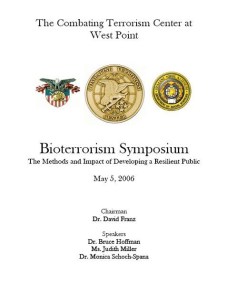Biological weapons pose unique challenges for U.S. defense and homeland security planners. In conceptualizing a response, U.S. policymakers thought first of technical solutions and training of emergency responders to protect the population or respond to a bioterror event. Next, they considered non-proliferation and traditional deterrence approaches to reducing the likelihood of an attack. More recently, some have begun thinking about strengthening the resolve of the general public in order to mitigate the effects of an attack and, perhaps, serve as a deterrent. The primary goals of this workshop were to:
- Explore the nature of public resilience and begin a conversation about both positive public policy measures to develop a resilient public and its strategic impact. What active or passive factors might influence public resilience? Is public resilience a deterrent or only of value because it mitigates the impact of an attack
- Educate the USMA community about the threat of bioterrorism and support the CTC’s goal of developing modular bioterrorism curriculum that can be inserted into existing classroom environments. It was intended to continue the discussion began during last fall’s symposium that addressed the technical issues relevant to bioterrorism.
- Facilitate a conversation between the speakers and the audience. Speakers gave brief statements that were followed by discussion. The audience included participants from numerous departments at the U.S. Military Academy, private industry, government laboratories, and other academic institutions.
- Advance the debate about bioterrorism at USMA, and in particular spark a discussion about how to adjust West Point curriculum so as to better prepare cadets for an uncertain world in which bioterrorism is a real threat. Our next generation of military leaders should have the capacity to engage the policy and technical issues that the nexus of scientific expertise and extremism pose to the United States and the world.
 Skip to content
Skip to content

